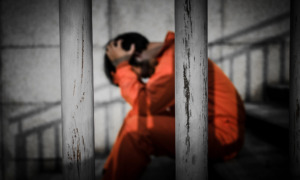Rep. George Miller (D-Calif.) spoke today about reauthorization of the Juvenile Justice and Delinquency Prevention Act (JJDPA) in an interview on Juvenile Justice Matters, the radio show of a D.C.-based advocacy group The Campaign for Youth Justice,
Miller is the chairman of the House Committee on Education and Labor, which is the committee that handles juvenile justice for the House. In the Senate the issue is largely the purview of the Judiciary Committee, which has already passed its version of JJDPA reauthorization and is looking to get it to the floor for a full Senate vote this summer.
The highlights: Miller expects a reauthorization bill introduced in the House “shortly,” and he appears to be a big fan of the Annie E. Casey Foundation’s Juvenile Detention Alternatives Initiative (JDAI).
Click here to listen to the interview. The following is a transcript of the interview written by it co-host, Eric Solomon. In the transcript, “ES” refers to Solomon, “JS” refers to co-host Jessica Sandoval and “GM” is Miller.
***
Juvenile Justice Matters
Interview with Congressman George Miller
May 6, 2010
ES: We are now joined by Rep. George Miller of California, chairman of the House Education and Labor Committee and champion of juvenile justice issues. Thank you so much for taking the time out of your busy schedule to join us on Juvenile Justice Matters Congressman.
GM: Thank you, I’m delighted to do it.
ES: Recently you held your first full committee hearing on the reauthorization of the Juvenile Justice and Delinquency Prevention Act or JJDPA, the 35 year-old piece of legislation that’s waiting for reauthorization and I just wanted to ask you why is this JJDPA legislation so important to reauthorize right now?
GM: Well, I think that it’s very important that we reauthorize the Juvenile Justice act and we do so because we now have, I think, a body of rather compelling evidence that the alternatives to incarceration, the alternatives to detention are working out much better for communities, in terms of building safer communities, are working out better for young people who are caught up in the justice system because of some activity that they took. It gives us a much better opportunity for those young people to turn their lives around. I think that the evidence is compelling and it’s across many different kinds of communities and we ought to re-write the law to reflect those experiences.
JS: Congressman Miller, this is Jessica, the co-host here on Juvenile Justice Matters and I wanted to mention that you had a lot of really great people testify at the recent hearing and I just was curious about what conclusions you made from hearing their testimonies, if any.
GM: I think the most compelling conclusion to me was, that where communities took a very hard look at their juvenile justice system and they really looked at the data and the information that they had and they looked at the resources that they could bring together to deal with the issues of juvenile justice, they started to see a system which they could make a very substantial change, without using, instead of using, detention, for those individuals, and they were able to dramatically reduce the use of detention facilities, the number of youth who were committed to the system, and certainly the impact on youth of color were dramatic reductions. The testimony we had by Judge Steven Teske from Georgia, the experience that they had when they worked with the Juvenile Detention Alternative Initiative. It really compelled them to look at the system and realize that it wasn’t working, it was very expensive, and it was more harmful than helpful to the young people that were caught up in the juvenile justice system.
ES: Another person who testified was Tracy McClard, she lost her son in an adult facility, and she had some pretty powerful testimony. What can be done with the JJDPA or any other legislation to prevent a loss of another youth in our juvenile justice system or in the adult system?
GM: Well when you look at happened to Ms. McClard’s son and how he simple was being moved through the system without any checkpoints, without any real circuit breakers as to whether this was the right treatment, this was the right detention, or the right activity for this individual, and then you look at a system that really has done these in depth reviews of their system in a comprehensive review of their system and you start to see that there is inserted points in that system where her son might have been taken out of the system put in alternative settings or given alternative treatments but at some point that was never allowed in the system that he was caught up in. I think when you compare the testimony of the witnesses that have taken these kinds of comprehensive reviews and improvements in the system and you compare that to Tracy McClard’s story of her son, you realize that he was in a system that was running on almost automatic pilot and he was just caught up in it until a tragic end.
JS: Well, as you know, California does not hold youth in adult jails or prisons, so we commend your state for that. We see that that’s a real leadership position that you all are in for the rest of the country, and we are just curious if you are in favor of removing kids from adult jails and prisons entirely in other states outside of California?
GM: Well, I think we should. I think what we see is when we rely on broadly based detention system, that what we are really doing is accelerating the involvement of these young people with the justice system for harsher treatment and a less successful outcome. So I think we want to reverse that process. What we want to be able to think when you look at how most people encounter the juvenile justice system, for the kinds of activities that get them there, not violent crimes, but other activities, we want them to be able to have the opportunity to turn their life around, to reject that kind of behavior, to keep them out of a very expensive and very inefficient system and have them go on with their life. What we see is the lock-up of young people with adults or long term detentions really mitigate against that and they end up driving deeper into the juvenile justice system with more encounters, more serious encounters and very expensive treatments.
ES: Yeah, and we know that every state essentially has different laws against trying and incarcerating youth as adults. California, of course, like Jessica said, you guys are definitely on top of things in making it so hopefully the rest of the country will follow suite. But what do you think with federal legislation and your about to introduce in the house, the JJDPA legislation, what are the priorities in that legislation and do you think that we can get down to telling some states what to do about, where to house these kids as adults?
GM: Well I think we should make an effort to set a priority in funding for those states and localities and in some cases localities are more interested in doing it then the states, but we ought to provide opportunities for both to develop a system that looks at the comprehensive nature of the system, how it can be improved, and what are the alternatives that can be developed? We have a number of years of experience now with the Juvenile Detention Alternative Initiative that was founded by the Annie E. Casey Foundation, a number of very diverse localities have used that, a number of states are looking at it, and we have seen some rather compelling improvements in the systems where that has been done. If states just want to do tomorrow, what they did yesterday, then I guess that’s okay, but that’s not what we ought to use the federal resources for. We ought to use the federal resources to change the system, especially when we have evidence that we can save tax payers money, we can lower the crime rate, and we can get a better outcome with the young people engaged in the system. That’s what we ought to be investing in.
JS: So what do you think is the likelihood that something that you are speaking of might actually be reauthorized in this Congress?
GM: I think so; I’m very encouraged that the Senate has started moving the bill. We expect to introduce it shortly. And there is clearly plenty of time left in his session to do this legislation and that’s my expectation that we will pass it in this congress, both the House and the Senate and send it to the president.
ES: Wonderful, what can advocates do to help you get the support and legislation passed?
GM: Well I think they have to develop a rapport in their local communities and show members of congress the kind of successes that we have seen, what the data now tells us about alternative to incarceration about alternatives to detention in these systems and about examining the system to see where you can make it more efficient and less harmful to young people, and that data is out there and I think that when members of Congress see that it just makes sense if nothing other from the point of view from the tax paper and being concerned about a crime rate in the community. I think that is the message that needs to be driven home and hopefully they will talk to local member of Congress to support this kind of legislation.
ES: Have you heard from any of your constituents about this?
GM: Yes, Oh yes, very much so.
ES: Well Chairman Miller, thanks again for joining us on Juvenile Justice Matters, we hope to have you back in the future and maybe we can have you back when this JJDPA has been reauthorized.
GM: I hope that’s what we can report on, thank you very much for your interest.
ES&JS: Thanks so much.





























